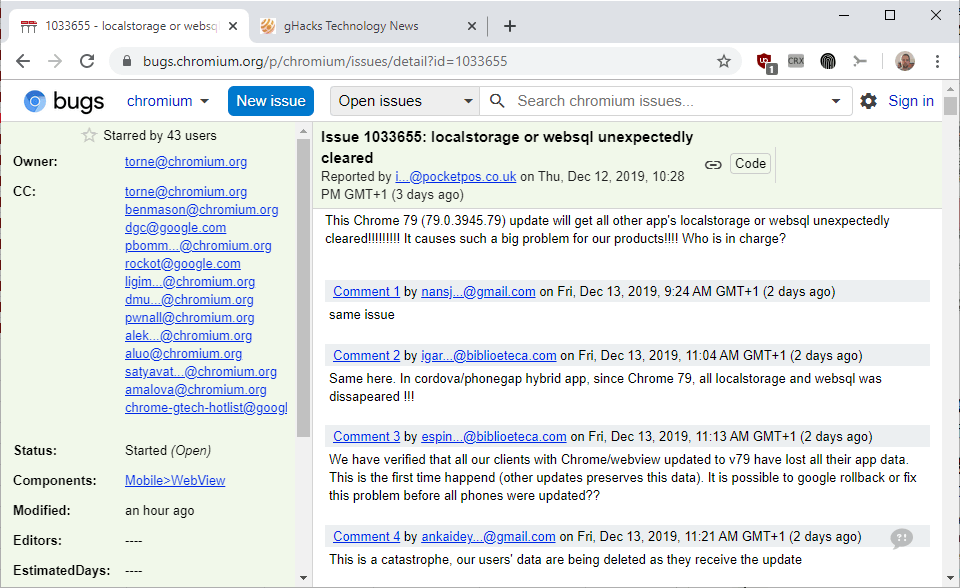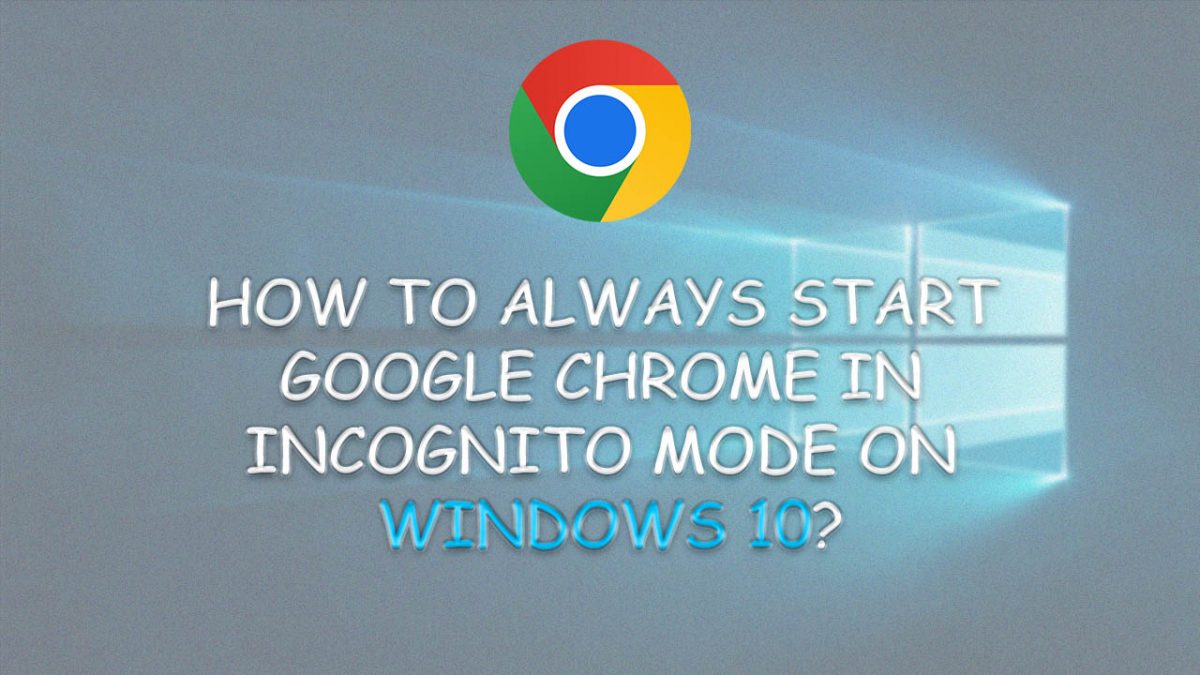Google stops rollout of Chrome 79 for Android

Google has stopped the rollout of Chrome 79 for Android. The new stable version of the mobile web browser was released last week for supported desktop and mobile operating systems.
Shortly after the release of Chrome 79 for Android, users started to post on the official Chrome Help forum claiming that data available in Chrome 78 was not migrated to Chrome 79. According to Google, the new version rolled out to 50% of the entire userbase already.
Developers too started to report the issue on the Chromium bug tracking site stating that the update to Chrome 79 would clear localstorage and websql.

While Chrome works fine when it comes to opening websites in the browser, it is applications that rely on WebView functionality that are affected by the bug. Some applications that are available on Google Play use the component to provide access to a website or web application, and these use local storage options such as WebSQL or localStorage to save user data locally.
In other words: any data that has been stored locally by the app, e.g. personalization and customization of the application, files, or credentials, are not loaded anymore. It appears that Google migrated data but forgot to include several key locations during migration. Further analysis revealed that the data is still there but that it is not loaded anymore by the applications.
One developer stated that encrypted login information from users was no longer available and that users who could not remember their login information could not access their accounts anymore according to Zdnet.
From a user perspective, it looks as if everything has been reset and that led to a high number of negative reviews for said applications on the official Play Store. Problem is, the anger, which is understandable, is directed against the wrong targets. Developers are not responsible for the issue but they face the consequences.
Google engineers are still discussing a solution for the issue. While it is possible to migrate data, it could potentially overwrite new data created by users since the update was performed.
Closing Words
Google stopped the rollout of Chrome 79 for Android and there is little that users can do currently. Those already upgraded to Chrome 79 face the bug and need to wait for Google to fix it. Whether that will result in a restoration of the data remains to be seen.
Now You: Are you affected by the issue?
























That is why forced auto-update should not be the norm. It is anti-user and mostly only benefits the software vendor. Google benefits by imposing ads on Chrome users and M$ benefits by imposing shorter EOLs on Win 10 users.
The default setting in update already caters for tech novices, ie they should be auto-updated. Let techies manually control the updates and accept the consequences.
Users should boycott software with forced auto-update.
No impacts noticed. Checked to see Chrome is already at 79.x on two devices – ZTE “L” phone uses standalone Android System Webview app, version 78 (no idea if versioning is corrrelated), and a Lenovo “O” Tablet with Webview 70.x disabled (by me) and in Developer Options, WebView implementation is set to Chrome instead. (As an “informed” end user rather than a nerd, I’ve found the transition from / interdependence of Webview with Chrome incomprehensible, but internet-based apps are working.)
I have an not-rooted Android phone, but uninstalled (or disabled) all but the most essential Google apps long ago. While my phone does no longer have Google Chrome as a standalone browser, I obviously had to keep Webview active, because several other apps depend on it. No data loss problems noticed here.
I don’t use Chrome, but I leave it enabled, and on both my P2XL and SGS10 I have v78 with no newer updates from Play Market.
When mozilla develop a firefox based webview :/
@Janne Granström There is Firefox Focus and Firefox Lite (which I think is only for SEA), but they don’t support extensions, namely ad-blocking and popup blocking ones which makes the browsers useless. Currently the only two browsers on Android that support extensions and thus a proper ad and popup blocking are Kiwi Browser which is a fork of Chrome and allows the install of Chrome extensions and Firefox Stable.
Firefox Preview is available to download on Google Play, which is a stripped down, built from scratch version of Firefox for Android, which is still in beta, and it’s intended to replace the current Firefox for Android, so far it doesn’t support extensions, but Mozilla said they plan to add support in the future.
Sadly, Firefox Preview still uses Gecko, which is already a subpar rendering engine compared to WebView(on Android) and Blink (on desktop) in all departments… Sadly Firefox lost the browser wars to Chrome and Blink.
Isn’t Firefox Klar/Focus: The privacy browser (which tracks you everywhere you go and reports back to moz://a) still based on WebView?
> Isn’t Firefox Klar/Focus: The privacy browser (which tracks you everywhere you go and reports back to moz://a) still based on WebView?
Nope, it’s based on GeckoView.
Though I have not used Firefox Focus or Klar recently, my understanding is that it was initially based on WebView, but then used Geko.
Firefox Lite, however, is intended to be and is a WebView browser.
Wow, just shows you that even the mighty Google can totally mess up their QA. Makes you put some of Mozilla’s recent mishaps into perspective.
Question of course is whether the data is still available in the cloud? Again, this brings into question why this was not seen in beta testing since it appears to affect many users?